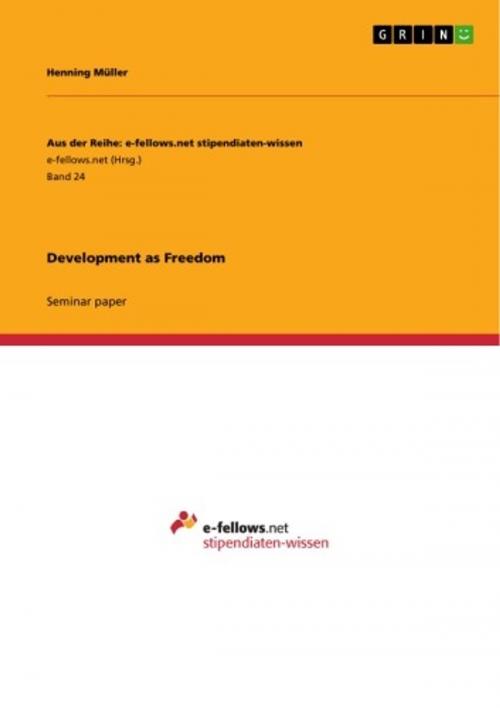| Author: | Henning Müller | ISBN: | 9783640945177 |
| Publisher: | GRIN Publishing | Publication: | June 28, 2011 |
| Imprint: | GRIN Publishing | Language: | English |
| Author: | Henning Müller |
| ISBN: | 9783640945177 |
| Publisher: | GRIN Publishing |
| Publication: | June 28, 2011 |
| Imprint: | GRIN Publishing |
| Language: | English |
Seminar paper from the year 2009 in the subject Economics - Economic Cycle and Growth, grade: 1,0, Johannes Gutenberg University Mainz, language: English, abstract: About 2500 years ago the brilliant Greek philosopher Aristotle surveyed in his Nicomachean Ethics the ends to which our conduct should be directed. He concluded with deep insight that 'wealth is obviously not the good we seek, for the sole purpose it serves is to provide the means of getting something else [emphasis added]' (Aristotle, 1975, p. 31). Until recent times, economists struggle for a commonly accepted primary 'end' as an overall policy goal. The ideas range from income and wealth maximization (often expressed in the per capita GNP) over 'the pursuit of happiness' as an 'unalienable right' in the US Declaration of Independence of 1776 to well-known measures of 'something else' such as the Gross National Happiness in Bhutan (cf. DiTella and MacCulloch, 2008). Another, indeed very famous, proposal originates from the work of Amartya Sen. He suggests to define freedom as the primary goal for societies and to measure the achievements in the space of feasible functionings, the so-called capability set. In this paper I seek to present Sen's theoretical conception of development as freedom and to provide both the background for tracing the process of origin as well as some exemplary applications to give an idea of the impact of his vision on economic problems. I will focus on the theoretical structure of his conception and will not go into details regarding empirical and historical data that can easily be found in standard literature on development economics. The theoretical background to Sen's approach, however, is not that intensively discussed and so my aim is to contribute to the understanding of the theoretical structure of his idea. In the beginning, I will give a brief overview of development as a general conception in economics. Therefore, I will go into areas, goals and a sample of measurements of development. In the second and central section of this paper I will analyze Sen's idea of development as freedom from a theoretical perspective. In doing so, I will picture the derivation of his idea from welfare economics and then scrutinize different aspects of freedoms in Sen's thinking that are crucial for a deep understanding of the deductions emanating from his approach. Finally, I will point out three exemplary applications of the conception of development as freedom on important economic problems, namely markets, poverty and democracy.
Seminar paper from the year 2009 in the subject Economics - Economic Cycle and Growth, grade: 1,0, Johannes Gutenberg University Mainz, language: English, abstract: About 2500 years ago the brilliant Greek philosopher Aristotle surveyed in his Nicomachean Ethics the ends to which our conduct should be directed. He concluded with deep insight that 'wealth is obviously not the good we seek, for the sole purpose it serves is to provide the means of getting something else [emphasis added]' (Aristotle, 1975, p. 31). Until recent times, economists struggle for a commonly accepted primary 'end' as an overall policy goal. The ideas range from income and wealth maximization (often expressed in the per capita GNP) over 'the pursuit of happiness' as an 'unalienable right' in the US Declaration of Independence of 1776 to well-known measures of 'something else' such as the Gross National Happiness in Bhutan (cf. DiTella and MacCulloch, 2008). Another, indeed very famous, proposal originates from the work of Amartya Sen. He suggests to define freedom as the primary goal for societies and to measure the achievements in the space of feasible functionings, the so-called capability set. In this paper I seek to present Sen's theoretical conception of development as freedom and to provide both the background for tracing the process of origin as well as some exemplary applications to give an idea of the impact of his vision on economic problems. I will focus on the theoretical structure of his conception and will not go into details regarding empirical and historical data that can easily be found in standard literature on development economics. The theoretical background to Sen's approach, however, is not that intensively discussed and so my aim is to contribute to the understanding of the theoretical structure of his idea. In the beginning, I will give a brief overview of development as a general conception in economics. Therefore, I will go into areas, goals and a sample of measurements of development. In the second and central section of this paper I will analyze Sen's idea of development as freedom from a theoretical perspective. In doing so, I will picture the derivation of his idea from welfare economics and then scrutinize different aspects of freedoms in Sen's thinking that are crucial for a deep understanding of the deductions emanating from his approach. Finally, I will point out three exemplary applications of the conception of development as freedom on important economic problems, namely markets, poverty and democracy.















